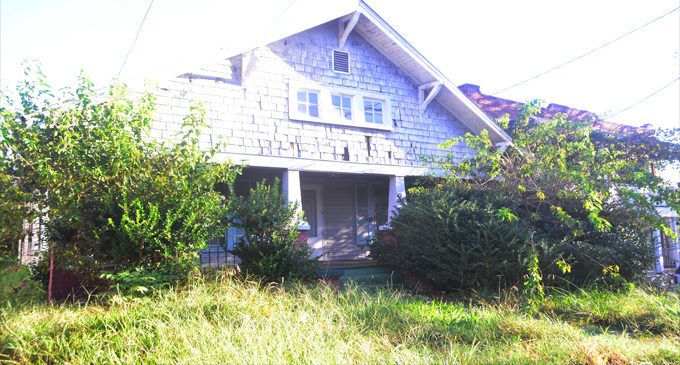Study on housing loss reveals few surprises for urban core
One of many abandoned houses in East Winston. The study conducted by New America takes a closer look at evictions and foreclosures in Forsyth County.

Last month representatives from New America, a think tank that focuses on a range of public policy issues, revealed findings from a study that took a closer look at evictions and mortgage foreclosures in Forsyth County. To no one’s surprise who is familiar with the area, the findings show that the communities east of Highway 52 are in dire need.
The year-long study that was part of a national study conducted by New America and coordinated locally with Winston-Salem State and Wake Forest Universities, ranked the level of housing loss for 2,200 counties based on their combined eviction and foreclosure rates, and overall severity of housing loss. With a housing loss rate of 4%, twice the national average, Forsyth County ranked 89th worst in the country.
Between 2014 and 2018, 12,276 households were evicted in Forsyth County and 6,221 properties were foreclosed. The numbers show 80% of all housing loss was due to eviction.
A closer look at the data shows housing loss is the highest in East Winston, North/Northeast Winston, (specifically the communities near the Smith Reynolds Airport, Lawrence Joel Veterans Memorial Coliseum and the fairgrounds), and Southeast Winston. When discussing the findings, Tim Robustelli, a policy analyst, said the average housing loss rate for Forsyth County was 2.6%, but some communities in East and Northeast had housing loss rates six times the county average.
Robustelli, after speaking with people in the community and looking at the numbers, said they discovered that the drivers of displacement in the area is a combination of low wages, lack of affordable housing and other factors. He said rent costs have increased by more than 5% while wages have decreased for 30% of residents.
“Rent costs have increased in recent years while wages for about a third of county residents have actually decreased,” Robustelli said. “There’s also a 16,000-unit shortage of extremely-low income rental housing, which is a striking figure, and projects funded by the Low Income Tax Credit and other affordable housing programs cannot make up that gap by any means.”
Robustelli also mentioned that Forsyth County has 1,524 heirs’ properties, the fifth highest in the state. Heirs’ properties refers to a home or land that passes from generation to generation without a legal designated owner resulting in ownership being divided among all living descendants in a family. This unstable form of home ownership limits a family’s ability to build generational wealth. It is also one of the leading causes of land loss among African Americans.
“There are a number of issues around heirs’ properties related to building generational wealth … it also leads to neglect when descendants of original owners move away and don’t care for the property,” Robustelli said. “It falls into disrepair, taxes aren’t paid and that sometimes can lead to tax foreclosures as well, certainly an avenue for further research.”
To remedy the issues here in Forsyth County, the study also included a list of recommendations, such as: expanding home ownership programs and affordable housing; adopting forward-thinking development policies; and creating “neighborhoods of opportunity.” The findings also recommend a national push to strengthen tenants’ rights and improve housing loss data and prevention of housing loss policy.
While the study and the recommendations are a step in the right direction, until we build sustainable communities where citizens have the opportunity to make a livable wage, the housing crisis here in Forsyth County will only continue to get worse, especially in the urban core.
“Stable housing is only the base for a community; to really thrive you need neighborhoods with good schools, access to good jobs, access to healthy grocery stores,” Robustelli said.
For more information, view the report at: https://www.newamerica.org/future-property-rights/reports/displaced-america/housing-loss-in-forsyth-county-north-carolina/.









